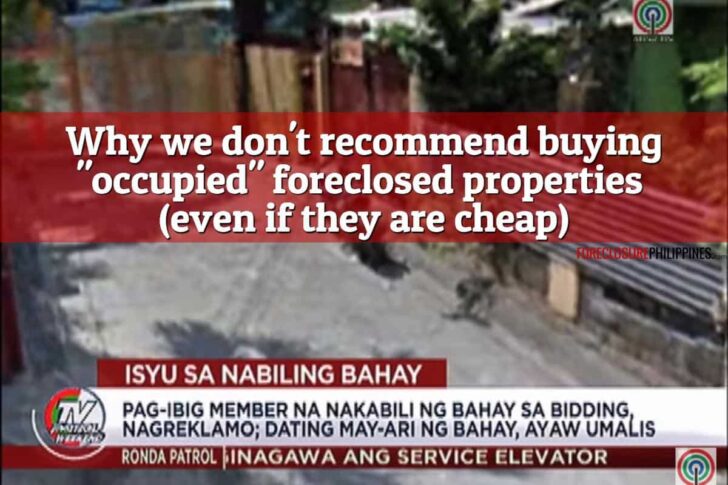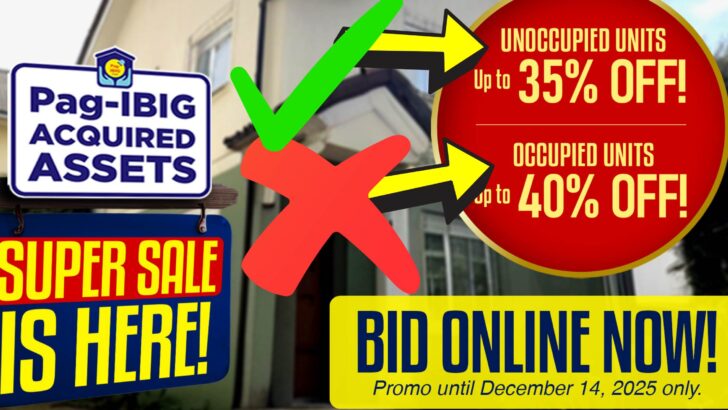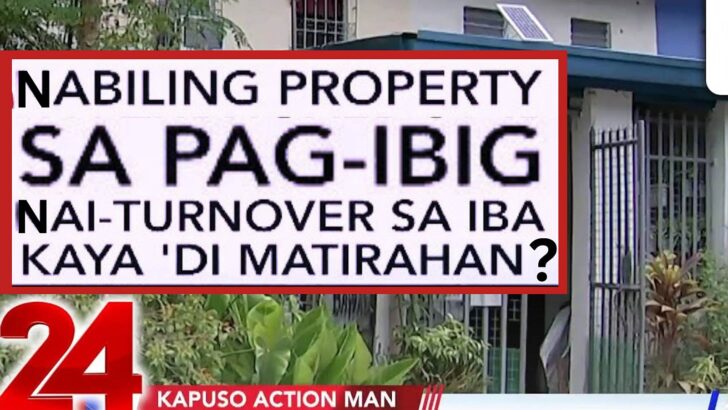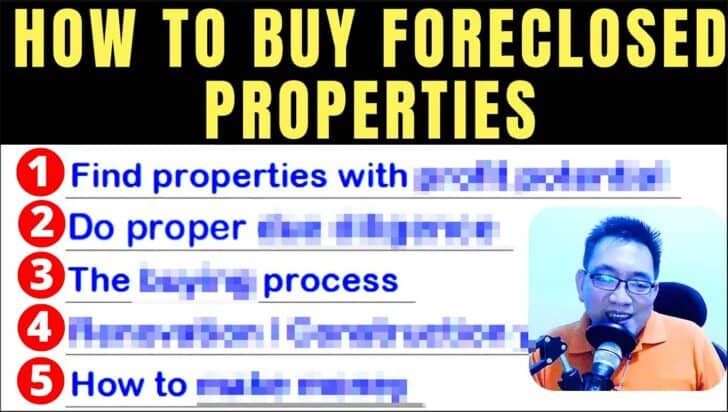This is a guest post by Angie Espiritu
The term “real estate bubble” sends shivers to many spines because of the fairly recent sub-prime bubble that happened in the United States. Stripping the word of all its technicalities, a real estate bubble is simply about spiraling prices and disappearing buyers, leaving some people holding a bunch of flaming balls with nobody to pass them on to. The flaming balls burn their cash.
To see if this will happen to the Philippines, let’s dissect the bubble.
Photo: marcusrg via flickr
The flaming ball allegory
Going back to the simple description above, there would have been no flaming ball if everyone was paying for real estate in cash. Like, one lifts Php4 Million from his pocket and buys a house from a convenience store, then sells that house a year later to a second owner who dips his fingers into his pocket, lifts Php6 million cash, and pays the first owner.
When a third owner buys it in cash for Php10 million and can’t sell it for any price higher than Php8 million, he’s the only one having a problem. The rest of the world goes on. The third guy can choose to hold the property until prices swing back up again. No big deal.
The flaming ball allegory happens when someone borrows money to acquire the property. Say, the third buyer above acquires the property for Php10 million through financing. He pays the bank Php100,000 monthly. Next thing he knows, prices have gone down and his property is now worth only Php7 million in the market. A friend who has bought a similar property at that price is paying the bank only Php70,000 a month.
The bubble bursts…
The third owner either keeps the flaming ball and waits it out til prices get better, or he cuts his losses by selling the house for Php7 million immediately and repays the bank for the balance some other way. This is when we say that the bubble bursts…
Or … he stops paying the bank and lets the bank take the overpriced property back! Imagine a million borrowers doing that. Cash flow stops and financing companies close down…or rescued. This is when we say there is a crisis.
Will that kind of thing happen in the Philippines?
Not likely. Here’s why.
1. We’ve been there. Banks won’t allow it the second time around.
In 1997, the scenario described happened. Banks learned from the lesson. The government learned a lesson too.
To rescue the banks, Congress passed The Special Purpose Vehicle (SPV) Act of 2002 or Republic Act 9182 (RA 9182 has been amended by RA 9343) to help banks get rid of non-performing assets and clean up their balance sheets. That helped substantially.
In turn, the banks made sure that they checked home mortgage loan applications more closely. They don’t want non-performing assets as much as restaurant kitchens hate rats, get the picture?
So, they made sure that a buyer made more than enough money to pay for the amortization of the loan, or they disapprove the application. Processes were (and are) strict, and this prudence paid off big time in succeeding crises that rocked the world.
2. Most of our buyers are end users of the properties, not speculators.
The likelihood that people buy a property with the intention of reselling it at a higher price is nil. Therefore the bubble is likewise nil.
(Jay Castillo: I believe true real estate investors are different from speculators as real estate investors buy properties that are below market value. Speculators on the other hand buy at market value and speculate property appreciation)
Most people in the market today buy a property for keeps. That’s a good thing. Even those who are paying Php15,000 or more a month have no qualms about renting their places out for less than that. “With money from the rent, I only need to raise Php ____ to pay the amortization,” you’d hear them say. That’s not the mindset of people who can cause a bubble.
In short, Philippine banks are effectively weeding out speculators with not enough capital to pay for the loans, while those who are able to secure the loans are not likely to resell them. Why would they? It’s their home!
Where can the bubble come from in this case? If you find it, tell me.
Have a great day!
Want to get notified when this is updated? Subscribe for free updates!
Get new/updated foreclosed listings, auction schedules, property buying tips, and more, sent straight to your email inbox. It's free!
Angelina B. Espiritu
http://makatihomesandcondos.com
http://propertiesatfort.com
http://www.nuvalilaguna.com
http://www.amaiascapesatlaguna.com
Angie Espiritu is the owner of Filben Realty – Your partner for optimal real estate investments. She is a PRC registered licensed real estate broker and an MBA graduate of De La Salle University.











Bullshit, and this is why – I have worked in the real estate business for 13 years and have never seen a bubble like the Philippines. They are actually more expensive than the US that a lot of ex pats have decided not to buy in their – Philippine Realtors greedy scheme. It is a country where corruption is almost legal, unemployment is high, a prime income is remittance. Unlike the US bubble the Phillppine bubble will be worse. Right now China is experiencing a hiccup, US has not really done a balanced budget. Europe is trying to save their ass off financially. Wait till the remittance slows down and no expats returning and living there and lets see what happens. Angelina you are either high or drunk. Banks wont allow it? You live in the Philippines do you see the squatters around you. If they want to beautify the street they haul them off and dump them somewhere – thats your reality.
I am a foreigner and have been living in Manila the past 6 years, and I own 4 condos here, one that i live in and two that are rented, and one under construction. The main issue here is too many condos being built at ever higher prices causing an oversupply and unrealistic rental rates. The locals cannot afford to buy so are priced out. Many agents lie to OFWs saying their unit is empty and then pocket the rent. My conclusion is if you buy very well, and rent at readonable rents you will do well. I bought about 3-5 years ago at P65-100K psqm, in buildings with first class amenities, great views, jobs and shops nearby….ok hope that helps.
Well, According to expert in property market the rise of purchase of real estate properties does not cause a bubble. The problem will only arise when everyone is enjoying the party given a growing economy, credit-aided purchases of houses and other properties become excessive. When people are lured into buying properties, usually with the aid of bank loans, amortization costs may exceed what people can actually afford.
Ms. Espiritu:
A. You base your argument that the Philippines is not the U.S. and went on to compare the differences. This is a fundamental mistake early on in this article.
Cause of United States housing crisis is different from Philippine’s. The first is a case of massive greed that centered on a few crooked Wall St. companies sitting on massive amounts of capital, that creatively lent the capital to unqualified home loan borrowers. (http://www.thisamericanlife DOT org/radio-archives/episode/355/the-giant-pool-of-money).
The Philippines’ is a case of people, real estate developers and businesses, flushed with cash, being “over-optimistic, to over-invest, and to over-produce.” (http://renohomeblog.com/2012/12/an-open-letter-to-philippine-p.php)
B. Banks will not allow it the second time? You may be right in a perfect world. Yes, your banks are probably better, way better, than U.S. banks. But it’s clear you’re giving your banks too much credit. The goal of banks is to still seek profit, and regulations like you mentioned does not ensure that it will stop from making similar risky bets to make a profit (like loosening lending standards), especially when cash liquid is plentiful.
There’s too much money floating around for them not to compete against other banks making a killing on profits and tread grey lines. Banks and developers over there are “one-upping” each other by bidding land up to unsustainable levels. (Paul Krugman talks about this from his acclaimed article “What Happened to Asia?” under #3, asset bubbles.
C. Not speculators? How can you sound so sure about this? Misleading. You don’t have to be 8 to 1 leveraged investing/kiting 8 properties to be considered a “speculator”. The fact that you are investing based on the assumption that current historically high yields will only continue seems to me just as a practical definition of a “speculator”.
Or someone who buys a property at inflated value, but think it is getting below market price.
I totally disagree with this article. Cebu city, Subic, Angeles City and Manila & Surrounding areas are a massive bubble. The real estate in these areas are increased to absurb amounts on the “hope” that an OFW, successful businessman/woman or a foreigner that is attached buys into the real estate. Land is being bought up and left right by companies who just sit on the property for years on years trying to flip the lots at 10x the price they paid for the land to begin with. There’s hundreds of housing areas throughout these cities sitting vacant because no one is willing to pay the insane prices. But just like the grocery stores that let meat, fruit and vegetables sit and literally rot because the companies are too “proud” to reduce prices and at least recoup some costs back into their expenses they will just let it sit there and rot till they throw it out. The same mentality is in the housing industry.
You say it won’t happen because the Banks are smart. The problem isn’t in the Banks the problem is in the corporations buying up land left and right. That no average citizen will be ever able to afford. What will eventually happen is laws will have to be passed for companies squatting on the ownership of land and refusing to reduce the prices.
Real estate companies are guilty of price fixing the value of properties and are the sole devil in the reason land is going through the roof. When there is absolutely no reason whatsoever for why I should pay more per square meter for land that sits directly beside a resettlement area than what I would pay per square meter to live in Beverly Hills, California.
Real Estate laws are a joke in the Philippines, Land Valuation is a joke and when you can “buy off” pretty much anyone in seats of power to get your own way then you have a serious problem. Anywhere else in the planet you would get laughed at for trying to sell land at 5,000 – 10,000PHP per square meter when that land is located by the slums, near an airport, inadequate utility distribution, unhealthy and unclean water distribution, pathetic transportation system, quality of roads, traffic congestion and the like.
I guarantee none of this listed above is considered in the “valuation” of land and if it was then you would see land for selling at what it’s really worth. Monthly prices for a lot should run no more than 25% of what monthly minimum wage salary is – and in my opinion anything smaller than a 500 sqm lot just isn’t worth it. WIth that in mind with most people making 6,000PHP a month and on a 30 year term that would be 1,500PHP a month or PHP 540K for a 500sqm lot in 30 years or 220K in cash. That’s at around 500PHP per sqm. Which is what the average cost of land in and around cities should be!
What most people fail to realize is just how ridiculous cost are now.
In 1982 a kilo of tomatoes was 50 centavos and minimum wage was around 150PHP a day.
In 2012 a kilo of tomatoes runs you 50PHP and minimum wage is around 300PHP a day.
If wages increased with inflation then minimum wage should be at 15000PHP per day! Or….tomatoes should not cost more than 1 PHP per kilo.
I could go on and on with hundreds of examples. This country is royally screwed and is not geared towards its fellow countrymen but to foreign investors, corporations, businessmen and successful OFWS.
Well if it’s the developers who are doing the speculating, then there would be no bubble burst.. just an ugly deflated plastic bubble 🙂 If there is really going to be an oversupply, the developers should very well keep an open mind about putting the units for rent themselves..
Very well said! 🙂
Please allow me to be a newbie in RE law:
So now banks have SPVs and from what I understand on the links, they can transfer ownership of their NPAs to SPVs (who will get benefits such as tax exempts, capital gains tax, doc stamps etc.) But doesn’t this also say that banks will no longer be motivated to sell their NPAs to investors?
Is there a good rental market for condos in Metro-Manila? I wish to buy a condo (cash) in Makati and was looking to rent it out. I live in Canada
I agree with Mario and Topo Abeleda, I would go as far as there is already a bubble.
As far as I can see the few developments here in Cebu are still underbought. Yet prices continue to appreciate, despite poor demand, ie empty units.
I am currently looking for a small lot for my boy, and I am floored by the insanity. It has essentially become less expensive to buy something in many areas of Canada or the States, where you will benefit from a stronger infrastructure and greater opportunities.
I don’t know the average wage in the Philippines is, but it is obvious that the average Filipino doesn’t make enough to support these prices.
The assumption that OFW’s are purchasing the condos I believe is flawed.
I was a former OFW, teaching in another Asian country and am not you typical OFW, 90% of which are skilled workers.
There may be a few who would want to buy a condo but definitely not a lot.
Why?
Simple! they have a house and lot (maybe 100-200sqm) somewhere in the province which they would rather fix/build a house on than buying a 20sqm condo in Makati for the the same price! (which by the way would be as big as their kitchen in the province!)
If assuming the real estate industry is counting on Retirees then there may be some sense to it, but again, how many retirees are there?
It is simple economics, demand and supply, as of now there is already an oversupply as domestic demand is there but cannot afford it.
Again, simple economics, 2M 20sqm condo, downpayment of around 400K, monthly of around 30K, can you check how many Filipinos can pay 30K monthly? To be practical, this would mean someone earning at least 100K/month but safer at 150K/month, so how many are there?
80% of Filipinos live below the poverty line, period.
Unlike the US where debt is traded, the Philippines will not run the same pattern, but the current oversupply will correct itself. (hopefully in a better way)
If I were the real estate companies, I would do the math and invest in nearby provinces and force the government to build roads and railways, cheaper lot, more affordable housing.
A convincing topic to tell the philippines, are still in the path way?
I agree with Mario, but one thing I would like to share.. There is already a “Housing Bubble” in the Philippines, what is not happening yet is for the bubble to burst. Although it is unlikely to happen soon, but I am sure it will happen.
Here’s why..
We all agreed that most buyers of properties today are OFW, although they are capable at the moment to pay amortizations , most of them are in 15-20 years financing program. Now the dilema is, do we expect them to be in the same job and the same country in the next 20 years to finish the financing program. If another crisis will hit other countries, OFW in that area will be greatly affected as we know it, because there is a fear they will loose their jobs.
The biggest problem will be the supply vs. demand. If the supply will continue to grow then this will cause the bubble to burst eventually. A very good example is Dubai, UAE. Dubai is said to be the financial hub in Middle East but most of its newly developed “urban cities” and “luxury communities” are tagged as “ghosts town”. Their main problem is over supply of units, they thought and speculate that expatriates in their country will buy properties and will settle there.
In the Philippines, if there is somebody speculating in the Philippine real estate market today, these are the developers. They speculate that the increasing number of OFW’s will eventually turn into sales.
So do not worry about delinquent buyers for now, because they are the last to happen
good post, tanks
That’s an excellent point. #2 is perhaps the biggest reason why the Philippines’ real estate industry is less likely to suffer that bursting bubble.
When it comes to high rise developments and condo units in Metro Manila, it seems to me that an oversupply has started to manifest itself in recent months.
From my experience, a large number of condo buyers are OFW’s intending to rent out or resell their units upon completion of the building. However, if you go an take a picture of the Global City in Bonifacio for example, you will notice quickly that only a few units are lit up at night, suggesting that most units are uninhabited.
This assessment is also backed by a recent Colliers International report stating that there’s an oversupply of condo units in Metro Manila (especially smaller units) of about 10%. Furthermore, it seems to me that the supply of units for rent has dramatically increased in past months, and rental rates have been stagnating or falling.
At last but not least, a lot of OFW’s who are buying units are US based or paid in US$. For them, the prices of condos have appreciated significantly in the last couple of years due to the falling value of the dollar (1US$ would buy you 56 PHP in 2005, now its only 43 PHP). Hence it would not be surprising to see demand for new condos fall, especially since domestic demand for condo units is virtually non existent.
In summary, the risk for a bubble in the Philippines would not be rooted in poor financing practices, but rather oversupply built on the premise of significant foreign demand.
You’re wrong in saying that rental rates are stagnating or falling, that’s because rental rates are actually soaring as high as sky. Owners need to recover months of loss when nobody is renting their expensive units, that’s why they need to jack up rental rates. Only fools would rent from these kind landlords/landladies.
interesting. i am based in the US and my wife wants to buy a condo in Metro Manila for us to use in the future. I told her that in 5 years the prices will have crashed.
I never thought about the loans to real estate developers as the source of the bubble. that is a very good point. if they cant sell the units, they cant pay their loans, banks take over the properties and have a fire sale 🙂
what is your opinion on just a simple oversupply of condo units in the Metro Manila area? even if there is no bubble burst, it still looks like there will be an oversupply soon.
Another way a bubble occurs is when real estate companies over extend themselves, they buy and construct properties when there is excess demand, cannot sell it and default on their loans.
Actually this is a topic I was asking my students to research on but it was quite difficult because of possible repercussions.
There is strong activity in the real estate sector right now especially in terms of high rise development, hopefully through equity rather than bank financing and the only way to really predict a real estate bubble would be for the real estate industry to provide true and accurate information to researchers who are studying this phenomenon.
Dear Sir Jay,
Please let me know how to determine the market value of a property.
Thank you very much.
Helen
Hi Helen, please check this post which explains how you can estimate the market value of properties, whether they be foreclosed or not: https://www.foreclosurephilippines.com/2009/07/how-i-estimate-market-values-of-foreclosed-properties.html. I hope this helps, cheers!
Like!
Thanks Angie for the great post!
You came at the right time Maam. Thanks! A minute ago, I was just wondering if the same problems experienced by the US can happen here in the Philippines anytime soon. And you came with an answer. =)
In the Philippines, banks are meticulous in C.I. when lending loans.
Contrary what happen to US real estate bubble. Did you know what started the bubble, it was the lending by banks to people for debt they call NINJA loans.. No Income No Job No Asset..
What’s the criteria to qualify for US citizen on this loan –> you know how to sign your name + 24months of good credit score (a person without a job is qualified on this)